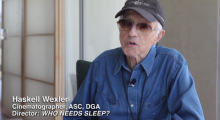Fair Use
-
Warhol v. Goldsmith: a Narrow Decision Preserves Fair Use As We Know It for Filmmakers

Fair use, a crucial right. Since 2005, when documentary filmmakers created their Documentary Filmmakers Statement of Best Practices in Fair Use, fair use has become settled industry practice. Fair use is what lets people quote from their culture for free, in the right circumstances. Ring tone in the scene? Paintings in the background? Want to use news clips to highlight the importance of events in the film or a stanza of a song you’re talking about? Check first to see if fair use applies; it very well might. Insurers cover fair uses, too, because they know the risk is low. Fair […]
by Patricia Aufderheide, Brandon Butler and Peter Jaszi on May 25, 2023 -
No Budget, No Problems? Intellectual Property Challenges for Film Production Start-Ups

“Guerilla filmmaking” is a term that refers to the process of shooting films with bare-bones crews, simple props, real locations and no permission. You rebel. The concept is not new, but it’s never been easier to sneak into a place with a camera in your pocket or backpack and still come out with high-quality footage. With you and your cousin being a two-person crew (and cast) and making the world your on-location shoot, certain aspects of the biz may be easier, but other important facets have not changed. Without permits or permission, municipalities may shut down your production, fine you […]
by Adam Litwin on Nov 7, 2016 -
Watch: Haskell Wexler and Others in Other People’s Footage: Copyright & Fair Use

Robert Johnson, Jr. and Diane Carson’s Other People’s Footage: Copyright & Fair Use is a documentary about exactly what its title says it’s about. Per the film’s website, the doc features “illustrative examples from nonfiction, fiction, and experimental films that use pre-existing footage, music and sound from other individuals’ creations,” while drawing upon a solid roster of lawyers, archival producers and other specialists in this often-muddy field. In this clip, the late Haskell Wexler discusses his strategy in using a Coors commercial in his documentary Who Needs Sleep?, followed by some interesting insights on the strategies used by 20 Feet from Stardom and Bowling for Columbine. […]
by Vadim Rizov on Apr 13, 2016 -
All Clear

“What surprised me more than anything when we got to Sundance,” says John Sloss about Randy Moore’s Escape from Tomorrow, “was this sort of tacit acceptance that this film will never see the light of day. Everyone kept saying, ‘See it here because Disney won’t allow this to be [commercially] released,’ as if Disney by itself has that power. That kind of compliant response awakened something in me.” Sloss, whose Cinetic Media was selling the film, may have been surprised at the industry’s dismall of its commercial prospects at Sundance, but I was not. A confession: After seeing the first […]
by Scott Macaulay on Oct 21, 2013 -
“The Past is Never Past,” but the Faulkner/Midnight in Paris Lawsuit Is.

One of the most vexing and unanticipated problems facing independent filmmakers involves realizing that brief, seemingly incidental references — a song lyric, the quoting of a movie character, or referencing a line from a novel — are actually copyrighted materials requiring clearance. Yes, there is what’s known as Fair Use — a doctrine allowing selective quotation of copyrighted works. But Fair Use is most often used in documentary and less so in fiction works. But a recent court ruling involving a William Faulkner line quoted in Woody Allen’s Midnight in Paris offers hope to filmmakers. This problem of quote clearance […]
by Scott Macaulay on Jul 24, 2013 -
MEDIA CURRENT: THE IP WARS
After the Thanksgiving recess, Congress is expected to vote on two bills that will influence the future of online Intellectual Property (IP). The Senate bill (S. 968) is dubbed the “PROTECT IP Act” (PIPA) which stands for the “Preventing Real Online Threats to Economic Creativity and Theft of Intellectual Property Act”; it was adopted by the Judiciary Committee in May. The House bill (H.R.3261) is the Stop Online Piracy Act (SOPA) and is currently being deliberated. The Motion Picture Association of America (MPAA), the music industry and a handful of digital rights holders, including games companies Sony and Nintendo, are […]
by David Rosen on Nov 28, 2011 -
BIG NEWS FOR DOC MAKERS: LIBRARY OF CONGRESS GRANTS DMCA EXEMPTIONS
Big news from the Library of Congress today. In their three-year annual review of the Digital Millennium Copyright Act, restrictions on documentary makers related to the fair use of copyrighted materials were significantly eased. Attorney Michael C. Donaldson, who assembled the coalition lobbying for these changes and provided pro bono counsel, commented, “Documentary filmmakers have been freed of the high price extracted by rights holders, or the high price of possible criminal prosecution, when they need to reach public domain material or material to be used pursuant to fair use. All they have to do is follow a few simple […]
by Scott Macaulay on Jul 26, 2010 -
MICHAEL PAUL STEPHENSON, “BEST WORST MOVIE”
The most unlikely act of cultural excavation and redemption, Michael Paul Stephenson’s Best Worst Movie is a hilarious and poignant celebration of not only the communal experience of making and watching movies but the sheer randomness of life itself. The doc is Stephenson’s attempt to find out why a seemingly execrable B-movie he made as a child actor, Troll 2, has garnered a cult following of viewers who not only get off on its badness but also find an odd kind of joy in its screwy storytelling. While Stephenson is present in the film, he smartly chooses as the doc’s […]
by Scott Macaulay on May 12, 2010
